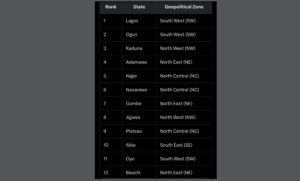In a recent data-driven assessment that has sparked widespread discussions across social media and among policymakers, Statisense, a leading Nigerian data analytics firm, has released its rankings of the best performing states in Nigeria for 2024. The list, derived from the State Performance Index (SPI) compiled by the Nigeria Governors’ Forum (NGF) for 2025, places Lagos State at the top, followed closely by Ogun State. Notably absent from the top 12 are all states from the South-South geopolitical zone, including oil-rich Delta State, prompting questions about regional disparities in governance and development metrics.
The SPI evaluates states based on a comprehensive set of indicators, including economic growth, infrastructure development, fiscal management, and service delivery, as part of the NGF’s ongoing efforts to benchmark state-level performance. Statisense, known for its rigorous data analysis and transparency in public reporting, shared the rankings via its official X (formerly Twitter) account earlier today, highlighting the top performers as follows:
The dominance of South West and Northern states in the rankings shows their strengths in areas such as industrialization in Lagos and Ogun, and agricultural and possibly security improvements in the North. Lagos, often referred to as Nigeria’s economic powerhouse, leads with robust performance in revenue generation and urban infrastructure, while Ogun’s second-place finish has been attributed to its proximity to Lagos and investments in manufacturing hubs.
However, the complete exclusion of the South-South region, comprising Akwa Ibom, Bayelsa, Cross River, Delta, Edo, and Rivers states, has raised eyebrows. Delta State, in particular, which has historically boasted significant oil revenues and recent accolades in budget implementation (ranking second nationwide with a 97.9% midyear budget performance rate earlier this year), is conspicuously missing from the list. This absence has fueled debates on X, with users questioning whether the index adequately accounts for resource-dependent economies or if underlying challenges like environmental degradation, and federal allocation dependencies are impacting scores.
One X user remarked, “Abeg where is Anambra state… I thought the governor is performing wonders there…. E don dey clear now.. Haha😂😂,” reflecting the broader surprise and tribal undertones in reactions to the rankings. Others praised the data’s objectivity, with comments like, “Data >>>,” emphasizing its role over emotional narratives.
Read Also:
- Army Chief inaugurates projects across South-South, vows stronger civil-military relations
- Diri, Oborevwori, Okpebholo seek common front for South-South
- Tinubu unveils 70 new appointments across Regional Development Commissions
Statisense also released complementary rankings today, including the most preferred states for relocation, where Oyo State surprisingly topped the list, followed by Akwa Ibom (South-South), the Federal Capital Territory (FCT), Kwara, and Osun. This relocation index, also based on the NGF’s SPI, factors in affordability, job opportunities, and quality of life, with three South-South states; Akwa Ibom, Rivers, and Cross River making the top 12. In contrast, the least preferred states include Bayelsa and Edo from the South-South, alongside others like Zamfara and Anambra.
A recent report on the relocation rankings, shows that Oyo edge due to lower living costs in Ibadan compared to Lagos and Abuja, with an inflation rate of 18.7% and recent food price drops. However, the best performing states list has not yet received extensive mainstream coverage, though it aligns with broader trends in the NGF’s annual assessments aimed at fostering competitive federalism.
Analysts suggest that the SPI’s methodology, which draws from official NGF data, may prioritize measurable outcomes in non-oil sectors, potentially disadvantageing South-South states reliant on federal oil allocations. Delta State’s Governor, Sheriff Oborevwori, has not yet issued an official response, but the state’s recent high budget implementation rate indicates strong fiscal discipline that could be leveraged in future rankings.







